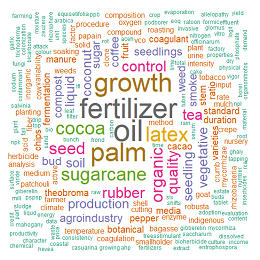Pengaruh Persentase Enzim Papain dan Bawang Putih pada Rendemen dan Kualitas VCO (Virgin Coconut Oil)
DOI:
https://doi.org/10.25181/jaip.v6i2.817Abstract
VCO is an oil produced from coconuts that are treated with no heating, one of them using papain enzyme. Vegetable oil is a compound that is easily hydrolyzed and oxidized to make the quality of oil decline. Garlic is a natural antioxidant that can inhibit the oxidation process. Therefore, a study was conducted to determine the effect of papain and garlic enzymes on the rendement and storage duration of VCO. This study used a factorial randomized block design with the first factor was percentage of papain enzyme (0%, 0,15%, 0,20%, and 0,25% and the second factor was percentage of garlic (0%, 0,5%, and 1 %) with 3 replications. The data of the research were analyzed by variance, followed by LSD test at 5% level. The results showed that the highest VCO rendement was obtained from the treatment of 0,25% papain enzyme. One percent (1%) garlic can maintain the quality of water content, FFA, density, and color of VCO at 3 months storage duration, except aroma. The combination of papain and garlic enzymes resulted in negative effect on rendement and cannot maintain VCO quality at 3 months storage duration. Keywords: enzyme papain, garlic, VCO storageDownloads
References
Badan Standardisasi Nasional. (2008). Minyak Kelapa Virgin (VCO). Badan Standardisasi Nasional Indonesia. Jakarta.
Fadlana, M. H. (2006). Pengaruh Suhu Penyimpanan dan Cara Ekstraksi Virgin Coconut Oil (VCO) terhadap Mutu Minyak yang Dihasilkan Selama Penyimpanan. Unpublished undergraduate thesis, Institut Pertanian Bogor, Bogor.
Five, B. (2004). Coconut Oil Miracle. Jakarta: PT Buana Ilmu Populer.
Iskandar, A., Ersan, E., & Edison, R. (2015). Pengaruh dosis enzim papain terhadap rendemen dan kualitas virgin coconut oil (VCO). Jurnal Agro Industri Perkebunan, 3(2), 82-93.
Ketaren, S. (1986). Pengantar Teknologi Minyak dan Lemak. Jakarta: UI Press.
Marjoko, G. (2015). Virgin coconut oil komoditas ekspor. Retrieved November 20, 2016, from www.rumahumkm.net/2015/08/vco-virgin-coconut-oil-komoditas-ekspor.html.
Raharja, S., & Dwiyuni, M. (2008). Kajian sifat fisiko kimia ekstrak minyak kelapa murni (virgin coconut oil, VCO) yang dibuat dengan metode pembekuan krim santan. Jurnal Teknik Industri Pertambangan, 18(2), 71-78.
Soekardi, Y. (2012). Pemanfaatan dan Pengolahan Kelapa Menjadi Berbagai Bahan Makanan dan Obat Berbagai Penyakit. Bandung: Yrama Widya.
Susilowati, I. T., & Harningsih, T. (2015). Penambahan bawang putih (Allium sativum) terhadap kualitas virgin coconut oil (VCO) sebagai minyak goreng. Jurnal Kesehatan Kusuma Husada, 6(2), 96-103.
Widowati, S. (2006). Dahlia bunganya indah, umbinya mengandung inulin. Sinar Tani edisi, 19-25.
Winarno, F.G. (1983). Enzim Pangan. Jakarta: PT Gramedia.
Winarti, S., & Jariyah, P. Y. (2007). Proses pembuatan VCO (virgin coconut oil) secara enzimatis menggunakan papain kasar. J Teknol Pertan, 8(2), 136-41.
Yuniastuti, K. (2006). Ekstraksi dan Identifikasi Komponen Sulfida Pada Bawang Putih (Allium sativum). Unpublished doctoral dissertation, Universitas Negeri Semarang, Semarang.
Downloads
Published
How to Cite
Issue
Section
License
Authors who publish with Jurnal Agro Industri Perkebunan agree to the following terms:
Authors retain copyright and grant the Jurnal Agro Industri Perkebunan right of first publication with the work simultaneously licensed under a Creative Commons Attribution License (CC BY-SA 4.0) that allows others to share (copy and redistribute the material in any medium or format) and adapt (remix, transform, and build upon the material for any purpose, even commercially) with an acknowledgment of the work's authorship and initial publication in Jurnal Agro Industri Perkebunan.
Authors are able to enter into separate, additional contractual arrangements for the non-exclusive distribution of the journal's published version of the work (e.g., post it to an institutional repository or publish it in a book), with an acknowledgment of its initial publication in Jurnal Agro Industri Perkebunan. Authors are permitted and encouraged to post their work online (e.g., in institutional repositories or on their website) prior to and during the submission process, as it can lead to productive exchanges, as well as earlier and greater citation of published work.


























